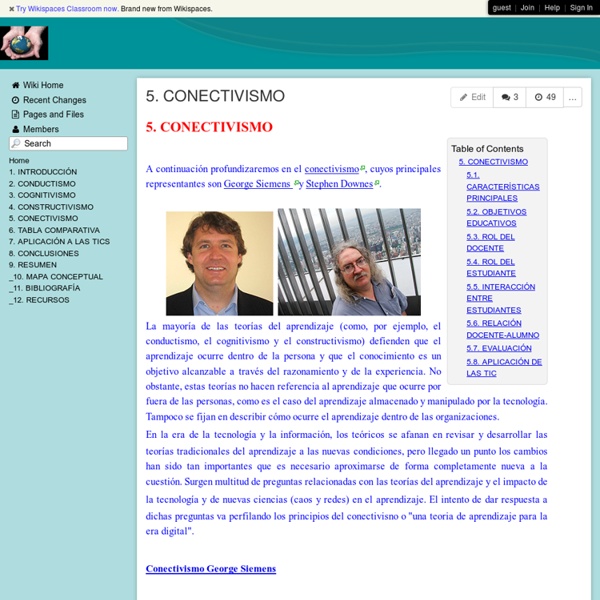



Conectivismo: Creatividad e innovación en un mundo complejo El pasado mes de noviembre se celebró el encuentro internacional de Fundación Telefónica. Fué una experiencia muy enriquecedora, por la innovación, el despliegue tecnológico, la calidad de las ponencias principales (como la de George Siemens) así como el gran trabajo de la Fundación Telefónica. En esencia, el conectivismo sostiene que el conocimiento se distribuye a través de una red de conexiones, y por lo tanto, que el aprendizaje consiste en la capacidad de construir y atravesar esas redes. El conectivismo comparte con otras teorías una proposición principal, que el conocimiento no se adquiere, sino que se tratara de un objeto. El conocimiento conectivo se cultiva, no se construye, es natural, no intencional, y es inherente, no representativa. El conocimiento es, según esta teoría, literalmente, el conjunto de conexiones formadas por acciones y la experiencia. A continuación comparto el resumen de lo aprendido con Georges Siemens, padre de la teoría del conectivismo:
Conectivismo - Nuevas perspectivas sobre el aprendizaje, enseñanza y Tecnología Clarissa Davis, Earl Edmunds, Vivian Kelly-Bateman Department of Educational Psychology and Instructional Technology, University of Georgia Review of Connectivism Introduction Just like anything else that involves human experience or interaction, the act of learning does not happen in a vacuum. It is at the intersection of prior knowledge, experience, perception, reality, comprehension, and flexibility that learning occurs. If you would like a quick introduction to connectionism, try looking at networked student in plain English video. Half-Life of Knowledge New technology forces the 21st century learner to process and apply information in a very different way and at a very different pace from any other time in history. Taking into account the ideas presented in the video, how is the 21st century learner supposed to assimilate all this information, and make valuable use of it? Components of Connectivism Chaos Theory Importance of Networks Connectivism Defined Citation
Éxito en E-Learning La educación a través de medios electrónicos es muy nueva como para decir que ya hay expertos en el tema, sin embargo si se pueden determinar algunos procesos que han sido exitosos y tratar de aprender de lo que se ejecutó en los mismos. El E-Learning se ha abierto camino contra viento y marea en el uso de las tecnologías digitales para llevar a cabo procesos de capacitación. La importancia del e-learning en cada empresa depende de su tipo y tamaño. El uso del e-learning o la educación a distancia por medios electrónicos brinda dos elementos altamente deseables. La educación a través de medios electrónicos es muy nueva como para decir que ya hay expertos en el tema, sin embargo si se pueden determinar algunos procesos que han sido exitosos y tratar de aprender de lo que se ejecutó en los mismos. Se debe dar igual importancia al método de evaluación, y no tanto para ser utilizado por terceros sino por el mismo estudiante.
Conectivismo en el aula: Educared 2011 Conectivismo en el aula: Educared 2011 Detalles Creado en Domingo, 06 Noviembre 2011 07:20 Visto: 7233 Conectivismo... En septiembre recibí la petición de la Fundación Telefónica de preparar una ponencia virtual para el encuentro de EducaRed de este año sobre la integración del Conectivismo en el Aula. Me resultó curioso que me hicieran esta petición, ya que en las redes me muestro bastante crítica con el Conectivismo. IV Encuentro Internacional EducaRed 2011 He recogido en el vídeo y en la presentación las ideas principales: ¡Muchas gracias a José Gregorio del Sol por ayudarme a grabar este vídeo! Después, charlamos sobre algunos temas en los foros. ¿Es el conectivismo una teoría? Como apunto en la presentación, desde mi punto de vista, el conectivismo es un concepto interesante pero no una teoría de aprendizaje. "¿Es el conectivismo una teoría? ¿Cómo se diferencian el conexionismo y el conectivismo? Desde mi punto de vista, al conectivismo se le puede achacar lo mismo que al conexionismo: